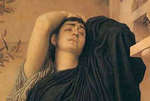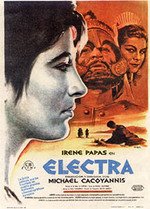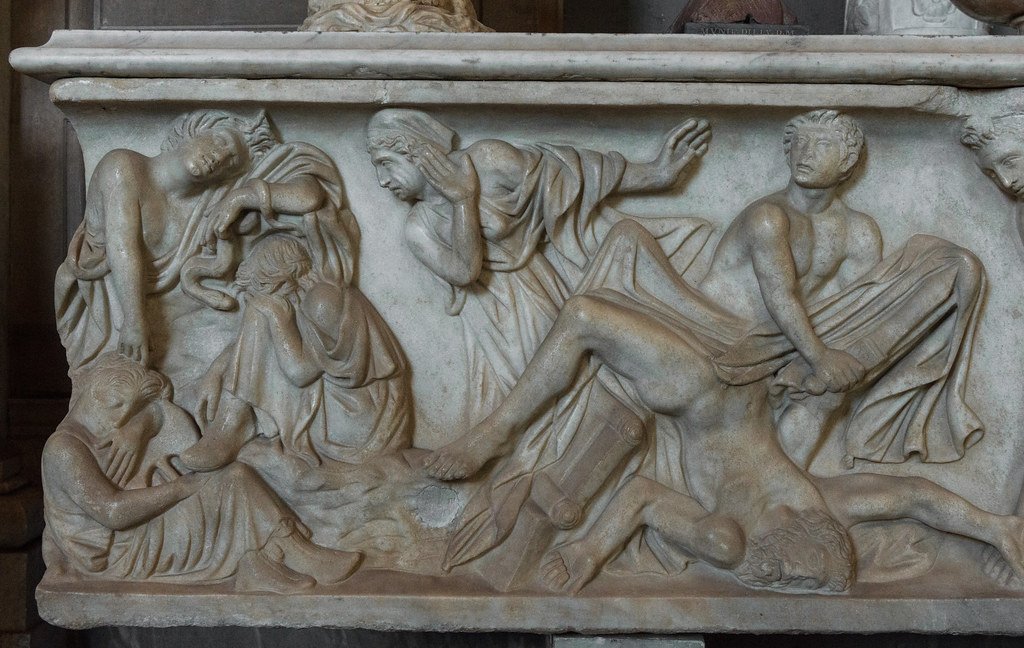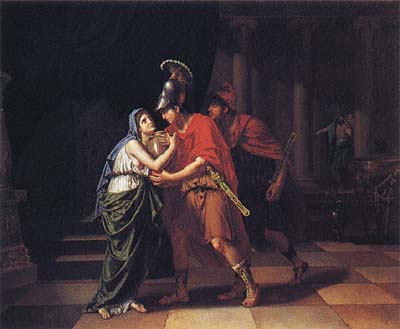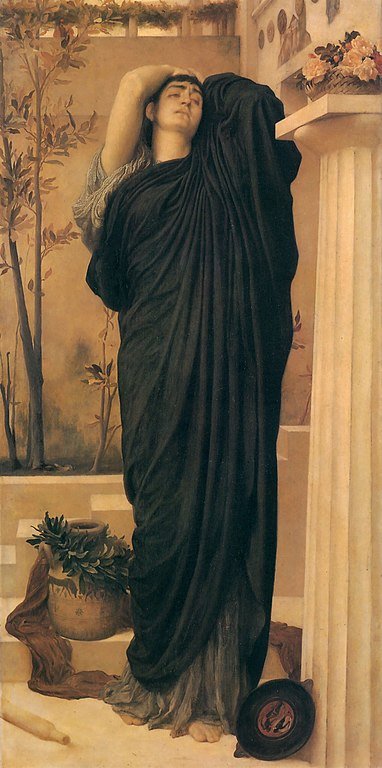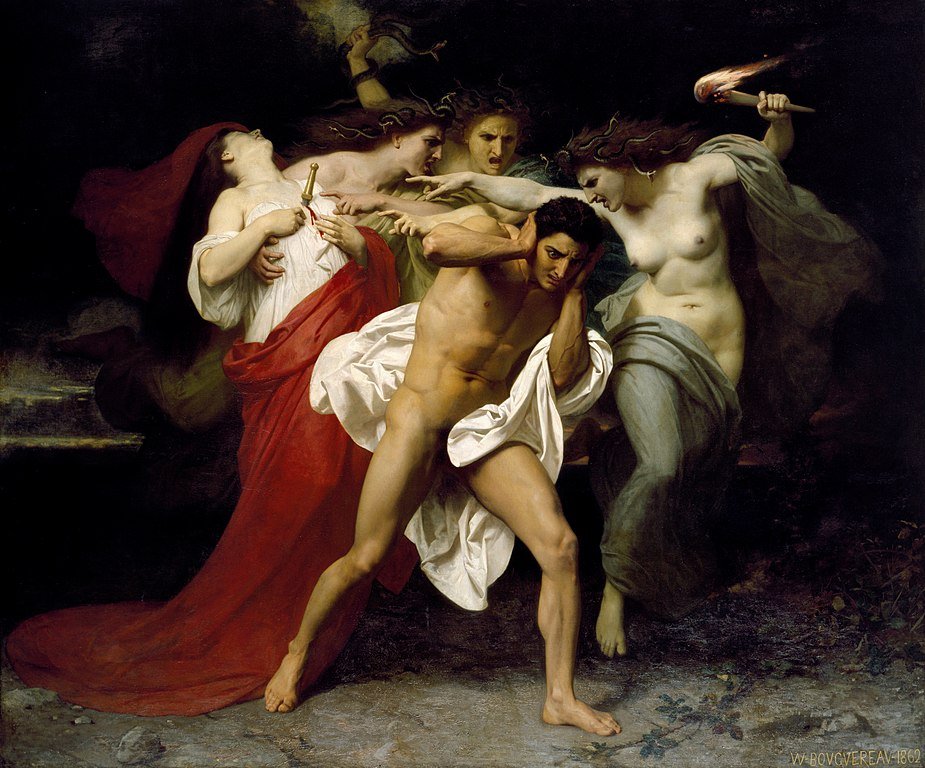
Orestes
Orestes by Euripides
First performed in 408 BC, Orestes is the last of all surviving Euripides plays to be produced in Athens during his lifetime. It radically reimagines the hero-myth of Orestes and follows the events that happen to him just after the murder of Clytemnestra. It begins with a speech by his sister Electra—sitting next to her sleeping brother—during which she informs us that she and Orestes are facing death penalty at the hands of the Argives for the murder of their mother. Their only hope now is Menelaus: he has just arrived from Egypt with Helen and, due to his past glory, an intervention from him on their behalf might turn things around. Orestes awakes only to suffer yet another attack of the Erinyes who seem more a figment of his imagination than real creatures. Menelaus arrives just at the right moment before Agamemnon’s court and, upon noticing Orestes’ terrible condition, immediately promises to speak in his favor. However, soon after, Clytemnestra’s father Tyndareus appears as well and threatens Orestes with execution, vowing to do everything in his power to see his grandson justly punished for his sins. He also threatens Menelaus not to intervene, which greatly affects Menelaus’ determination; even though Menelaus leaves with a promise to do something, it is vague enough to leave Orestes hopeless. This changes a bit after his faithful friend Pylades returns to Argos; he rouses Orestes’ feeble spirits, and eventually convinces him to go to the assembly and defend his actions. However, not long after, a messenger reports to Electra that the assembly has decreed against them. Faced with imminent death, the siblings are easily persuaded by Pylades to refuse to accept their destinies lightly. The three agree to exact vengeance upon Menelaus first: their initial plan is to kill Helen before they are killed themselves but then, they change their minds and decide to also kidnap Menelaus’ daughter Hermione and use her to buy their own freedom. In line with the plan, Orestes and Pylades go into the palace, and Electra lures Hermione inside. A slave of Helen emerges on the roof and announces that Orestes and Pylades have tried to kill his mistress. By the time Menelaus arrives there to save at least his daughter, the place is in mayhem: Electra and Pylades hold torches and threaten to burn the palace down, and Orestes is holding a sword to Hermione’s neck on the palace roof. Suddenly, as is customary in Euripides, a god (in this case, Apollo) appears out of thin air with Helen by his side, and announces that Orestes and Pylades didn’t kill Menelaus’ wife: per Zeus’ orders, she has been instead taken to heavens to dwell among the gods. He also orders—implicitly, by predicting the future of all characters—the release of Orestes who, after one year in exile, is supposed to marry none other than Hermione. He also predicts that Electra will marry Pylades and that Menelaus will rule Sparta for many years to come.
Date and Historical Background
Orestes was first produced at the City Dionysia of 408 BC, just a little before Euripides retired to the court of King Archelaus in Macedonia where he died two years later. The other plays of the tragic trilogy are not known, but it is possible that Cyclops was the satyr play. What is known, however, is that the play was repeatedly performed after the death of the great tragedian and before its text was standardized for the copy of the Alexandrian library, so it is possible that at least some of the play’s scenes were introduced by actors and directors during the century after Euripides’ death.
Characters and Setting
Characters
• Orestes, son of Agamemnon and Clytemnestra, brother of Electra, murderer of his mother
• Electra, daughter of Agamemnon and Clytemnestra, sister of Orestes
• Helen, sister of Clytemnestra, wife of Menelaus
• Menelaus, king of Sparta, brother of Agamemnon, husband of Helen
• Hermione, daughter of Menelaus and Helen
• Tyndareus, father of Helen and Clytemnestra
• Pylades, Orestes’ best friend
• Messenger, an Argive citizen
• Phrygian, a slave of Helen
• Apollo, the god of light, inciter of Clytemnestra’s murder
• Chorus of Argive women
Setting
The play is set before the court of Agamemnon in Argos.
Summary of Orestes
Prologue
It is the sixth day after the murder of Clytemnestra and Aegisthus. Before the royal palace of Argos, Orestes lies sleeping on a couch with a heavy, restless dream. With shaved head and dressed in black, Electra sits just near his bad and quietly narrates the story of the siblings’ family, all the way back to Tantalus. It is a grim and hideous story filled with everything from familicide to mariticide to matricide. Electra and Orestes are guilty of the last: to avenge the murder of their father Agamemnon—and incited by Apollo—they killed their mother Clytemnestra. Ever since Orestes has been tormented by the goddesses of revenge (the Erinyes) with dreadful hallucinations that have destroyed his will to live. He hasn’t eaten or bathed himself for six days. In addition, the city of Argos has decreed that no man should give Electra and Orestes shelter or even speak to them. But that’s all about to end, for better or for worse—on this day, the Argive assembly will decide whether they are both to die by stoning.
“There is, it is true, one hope of escape from death,” Electra says a bit more positively. It is Menelaus, who has just recently landed from Troy after ceaseless wonderings. If he returns fast, he might be able to save the siblings by putting a good word for them. And how does Electra know that Menelaus has returned? It is because, during the previous night, Menelaus sent his wife Helen to be hidden inside the palace of Argos, in fear that if she comes with him by day and is seen by any of those parents whose sons died at Troy she might be to stoned. Electra tells us that Helen hasn’t stopped weeping ever since arriving: for herself, for her sister Clytemnestra, for the calamities of her family. Her only solace seems to be her daughter Hermione, the child she had left at home before sailing away to Troy. Speak of the devil and he will appear, they say. That’s precisely what happens here: as if summoned by Electra’s story, Helen comes out of the palace and asks her niece to make an offering on the tomb of Clytemnestra on her behalf. Claiming that she can’t bear to look upon her mother’s grave, Electra declines and suggests Helen to send her daughter Hermione instead. Helen thinks this a good advice and returns inside the palace.
Parodos (Entrance Song)
The Chorus of Argive Maidens quietly enters. They ask Electra questions about Orestes’ health. Electra tells them in brief, but begs them to be quiet so that Orestes doesn’t wake up: “you will kill him,” she says, “if you disturb him from the sweet sleep he now enjoys.” “Is there an end of his troubles?” the Chorus asks fearfully. “There is,” Electra answers. “Death. Death, what else?”
First Episode
All this talk awakes Orestes who seems fresher than ever. He is happy: “Sweet charm of sleep, savior in sickness, how sweetly you came to me, how needed! Revered forgetfulness of troubles, how wise a goddess you are, and invoked by every suffering soul!” Electra lovingly helps Orestes get up from his couch—for the first time in a while—and reveals to him that there might be some hope for them: “Menelaus, your father's brother, has come; his ships are moored in Nauplia.” “What did you say?” replies enthusiastically Orestes. “Has he come to be a light in our troubles, a man of our own family, who owes gratitude to our father?” Though the answers are positive, Orestes deems that the signs are not, bemoaning the fact that Menelaus hasn’t come alone, but with his wife Helen. The dialogue between the siblings is suddenly interrupted by an attack of madness. In his hallucinations, Orestes is attacked by the Erinyes and asks Apollo for his “horn-tipped bow” to ward off the goddesses. He mistakes Electra for one of them—but only realizes this once the crisis is over and he sees Electra crying. He consoles her and thanks her for her devotion. “If you leave me or fall sick from nursing me,” he says, “I am lost. You are my only ally; I am deserted by all the rest, as you see.” Orestes asks Electra to enter the house and rest. She does that, and he lies back upon his couch.
In the first stasimon, the Argive maidens sing a prayer to the Erinyes. “I beg you, I beg you!” they cry, “allow the son of Agamemnon to forget his wild whirling frenzy.”
Second Episode
The prayer of the Chorus is interrupted by the expected arrival of Menelaus who wastes no time to ask them about Orestes’ situation. However, the question is uttered loudly enough to awake the barely asleep Orestes who staggers toward his uncle from the couch and asks to be allowed to tell his story in his own words. Menelaus—who has last seen Orestes as a baby in Clytemnestra’s arms—is shocked to see the condition of his nephew whom he describes as a “living corpse.” However, he seems sympathetic to Orestes’ plight, especially after hearing that he is tormented by the Erinyies and that Apollo himself—“showing a strange ignorance of what is fair and right”—commanded him to kill his mother.
The discussion is far from over when Tyndareus, Helen and Clytemnestra’s father, appears, “struggling with aged step, clad in black robes, with his hair cut short in mourning for his daughter.” After courteously and wholeheartedly greeting his son-in-law Menelaus, Tyndareus wastes no time to accuse Orestes—“a loathed viper darting venomous flashes from his eyes”—of lawlessness and godlessness. Menelaus tries to defend him, but Tyndareus won’t have it, reproaching Menelaus for becoming a barbarian after a decade spent fighting them. “If right and wrong are clear to all,” he says angrily, “who was ever more senseless than this man, because he never weighed the justice of the case, nor appealed to the universal law of Hellas? For when Agamemnon breathed his last—a most foul deed, which I will never defend—he should have brought a charge against his mother and inflicted a holy penalty for bloodshed, banishing her from his house; thus he would have gained moderation instead of calamity, keeping strictly to the law and showing his piety as well. As it is, he has come into the same fate as his mother—for though he had just cause for thinking her a wicked woman, he has become more wicked by murdering her.” Menelaus is compelled to agree that if everybody acted like Orestes, then the vicious cycle of revenge would never end. “Our forefathers settled these matters the right way,” Tyndareus forcefully concludes. “They forbade any one with blood upon his hands to appear in their sight or cross their path; but they purified him by exile, they did not kill him in revenge. Otherwise someone, by taking the pollution last upon his hands, is always going to be liable to have his own blood shed.”
Orestes tries to defend himself, citing Apollo’s command in his favor, but his supposed brazenness only enrages Tyndareus a bit more and he departs with a promise to go to even greater lengths in procuring Orestes’ execution. Before leaving, he also threatens Menelaus with banishment and death the minute he sets foot on Spartan land should he stand in Orestes’ defense. Left alone with his uncle, Orestes begs Menelaus for help, but Menelaus’ determination is visibly shaken, and he leaves with a vague promise to “try to persuade Tyndareus and the city to moderation.” “Alas!” shrieks the miserable Orestes. “I am betrayed; no longer do I have any hope of finding a refuge where I may escape the death-sentence of Argos; for this man was my haven of safety.”
Fortunately, at the same moment, Orestes’ best friend Pylades arrives from Phocis, after having been banished by his father Strophius for assisting a matricide. After learning everything about the nature of Orestes’ current situation, Pylades persuades his friend to go to the assembly and defend himself—especially now when he knows that nobody else will, that is undoubtedly his only chance. Orestes agrees and, leaning on Pylades’ shoulder, heads toward the assembly.
In the second stasimon, the Argive maidens recount the murder of Clytemnestra, unable to even imagine the horror of the deed. “O the wretch!” they sing. “He saw a mother's bosom over her robe of golden weave, and yet he made her his victim, in recompense for his father's sufferings.”
Third Episode
The third episode starts with Electra exiting the palace and noticing, alarmed and terrified, the absence of Orestes. The Chorus has barely started explaining to her when a Messenger arrives and informs Electra that the assembly has convicted her and Orestes to death. As per his report, the first speaker was Talthybius, Agamemnon’s herald and always “a mere tool of those in power,” who expressed high admiration for his former master, but didn’t praise Orestes. Then Diomedes suggested exiling the murderers instead of stoning them, but Tyndareus vigorously objected to this and managed to sway the mob in the opposite direction, despite the protests from an unnamed farmer who had been adamant that instead of killing, the Argives should crown Orestes for his deed. Orestes spoke last, but the only thing he achieved with his speech was to convince the assembly to allow him and Electra to kill themselves, rather than be stoned to death.
As the Messenger leaves, Electra and the Chorus (in a lyrical monody and the third stasimon) lament this outcome and bewail the fact that the entire race of Pelops is about to become extinct.
Fourth Episode
Not long after, Orestes and Pylades come back from the assembly. The siblings bemoan their fortune, but it is obvious that they have accepted it. Pylades feels differently: “since we are to die,” he says, “let us take counsel together that Menelaus may share our misfortune.” To this end, Pylades suggests that the three should infiltrate the palace and kill Helen. That way, he says, Orestes will not be remembered as “the matricide,” but as “the slayer of Helen the murderess.” The last may even clear his name just enough to grant him a pardon. At the same time, Menelaus will be punished for not standing up for his brother’s children. If this original plan goes awry, they can always set fire to the house and die. Either way, they will achieve one distinction: “an honorable death or an honorable escape.” Preferring the latter, Electra adds that the three should also seize Menelaus’ daughter Hermione as a hostage. That way, they will be able to blackmail Menelaus into rescuing them; if he is not convinced, they can always kill Hermione as well.
In the fourth stasimon, as advised by Electra, the Chorus surveys the streets around the palace to help the conspirators with their plan.
Fifth Episode
“Slay her, kill her, destroy her!” orders Electra her brother and Pylades from inside the palace. “Stab with your twin double-edged swords the woman who left her father, left her husband, and killed so many of the men of Hellas.” Helen’s cries can be heard briefly after, followed by a mournful silence. The Argive maidens interrupt it to inform Electra that Hermione is rushing back from the tomb of Clytemnestra. Electra goes out of the palace and, after convincing her that the cries she might have heard were in fact Orestes’, deceives her into going inside. Once there, she is seized by Pylades and Orestes.
To hide what is happening inside, the Chorus makes some noise and secretly expresses its joy over the supposed death of Helen. Suddenly, a Phrygian slave climbs out of the palace to the roof and starts recounting to the Argive maidens the assault against his mistress. However, he cannot share with them the final outcome, for just as Orestes and Pylades were about to slay Helen, she somehow, “whether by magic spells or wizards' arts or heavenly theft,” vanished from the room. Orestes comes out and threatens to kill the Phrygian, but eventually lets him go.
In the fifth stasimon, as the smoke of torches can already be seen on the top of the palace, the Chorus expresses determination not to inform the citizens of what is happening.
Exodos (Exit Song)
After having heard from rumors that Helen has been murdered and that Hermione is a hostage of Orestes and Electra, Menelaus rushes to the entrance of the palace. Suddenly, Orestes appears on its roof, holding a sword to Hermione’s throat and threatening to burn the house. Menelaus doesn’t succeed in making him wiser: after a brief exchange, Orestes orders his sister and his friend to kindle the fire.
Fortunately, at that moment, Apollo and Helen appear above the roof. The god reveals that Helen was never killed (but brought to heaven in accordance with the will of Zeus) and orders an end to the violence. Afterward, he predicts the protagonist’s future: Orestes will be exiled and roam for one year before reaching Athens where he will be acquitted by the assembly. Afterward, he will become the king of Argos and marry none other than his current hostage: Hermione. Apollo predicts a similar happy ending for the other two conspirators: supposedly, Pylades and Electra will marry each other. Menelaus obeys. The Chorus celebrates victory.
A Brief Analysis
Owing to its peculiar structure, for long it was believed that Orestes was a pro-satyric play, that is to say, the fourth one in a tetralogy which included the now-lost Hypsipyle and Antiope (as opening and closing plays of the tragic trilogy), and the surviving Phoenician Women as the middle tragedy. However, this theory is based on a doubtful interpretation of a note by a scholiast in Aristophanes’ comedy Frogs that should probably be interpreted differently (see for more the “Date and Historical Background” section in The Phoenician Women).
Be that as it may, Orestes is, undeniably, unlike any other of the surviving ancient tragedies in terms of how loosely it is based on previous stories and how boldly it pushes the boundaries of myth (Allan and Storey). Almost everything in the play is clearly invented by Euripides: the presence of Tyndareus during the trial, Menelaus’ role in the events, the attempted murder of Helen, the modern-like abduction of Hermione. Even more interestingly, this list encompasses some subtleties such as the fictional nature of the Erinyes or the singed announcement by the Phrygian slave. The former makes Orestes’ madness much more real; the latter, in its bizarreness, might even provide one of the earliest examples of an essentially 20th-century phenomenon: black humor.
However, what is perhaps most startling in Orestes is the anti-heroic nature of the main protagonists. As sympathetic as Orestes, Electra and Pylades might seem at the beginning, by the end of the play they have attempted both murder and abduction of two essentially helpless and innocent characters (Helen and Hermione), so it is fairly difficult to have compassion for them. On the contrary, in fact, their devious plans make it much easier for one to understand how they might have killed Clytemnestra and, more importantly, why they have done that. After all, Tyndareus’ argument against their release is quite simple: there were other ways for Clytemnestra to be punished for her grievous deed, but Orestes and Electra seemed to have chosen the unlawful one. Implicitly, Orestes himself can’t understand his motivations or justify his acts, at one point even equating the voice of Apollo with that of a demon.
Because of all this, it’s safe to say that in no other play by Euripides does the deus ex machina ending seems as unsatisfactory as it does here: after all of the accusations directed at him, Apollo doesn’t seem like someone with enough integrity to untangle the Gordian knot of Orestes’ human affairs, and at least one of his prophecies—concerning the marriage of Orestes and his abductee Hermione—rather than just, seems quite unmerited. “In many ways,” conclude Allan and Storey somewhat boldly, “this is Euripides’ most brilliant piece of theatre.” It is certainly not in terms of structure or character portrayal, but at least in terms of action, modernity and creative invention, it might be indeed.
Orestes Sources
There are many translations of Orestes available online, both in verse and in prose; if you are a fan of the latter, you can read E. P. Coleridge’s translation for Loeb Classical Library here. If, however, you prefer poetry, feel free to delve into Arthur S. Way blank verse adaptation here.
See Also: Euripides, Oresteia, Electra, Orestes
Orestes Video
Link/Cite Orestes Page
Written by: The Editors of GreekMythology.com. GreekMythology.com editors write, review and revise subject areas in which they have extensive knowledge based on their working experience or advanced studies.
For MLA style citation use: GreekMythology.com, The Editors of Website. "Orestes". GreekMythology.com Website, 30 Jan. 2020, https://www.greekmythology.com/Plays/Euripides/Orestes/orestes.html. Accessed 19 April 2024.

